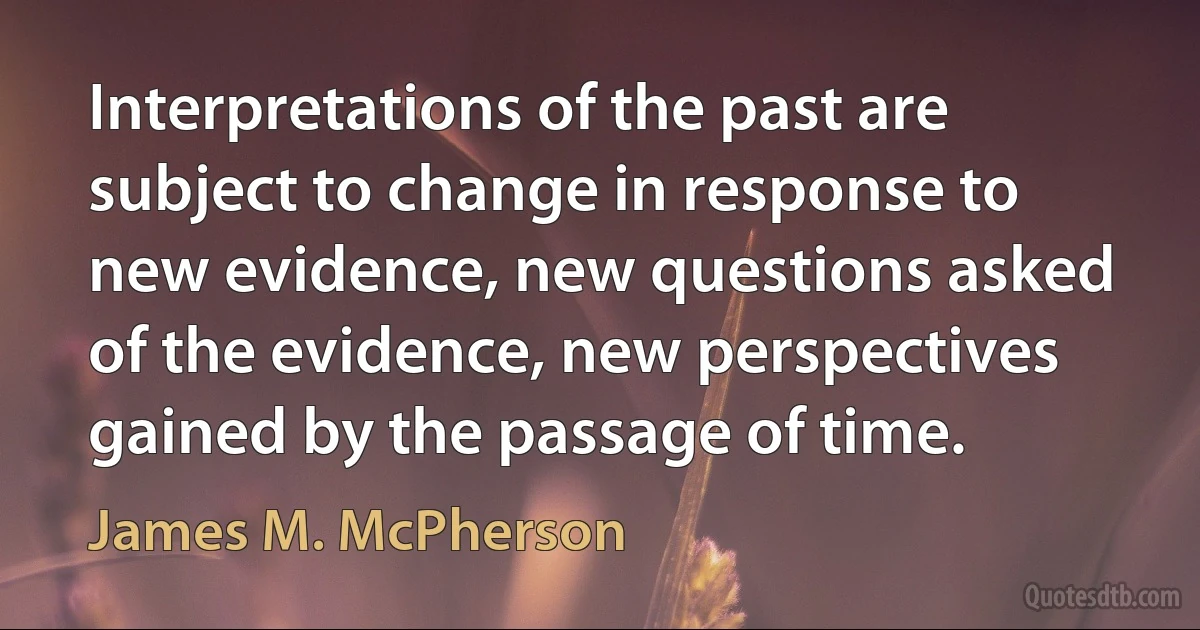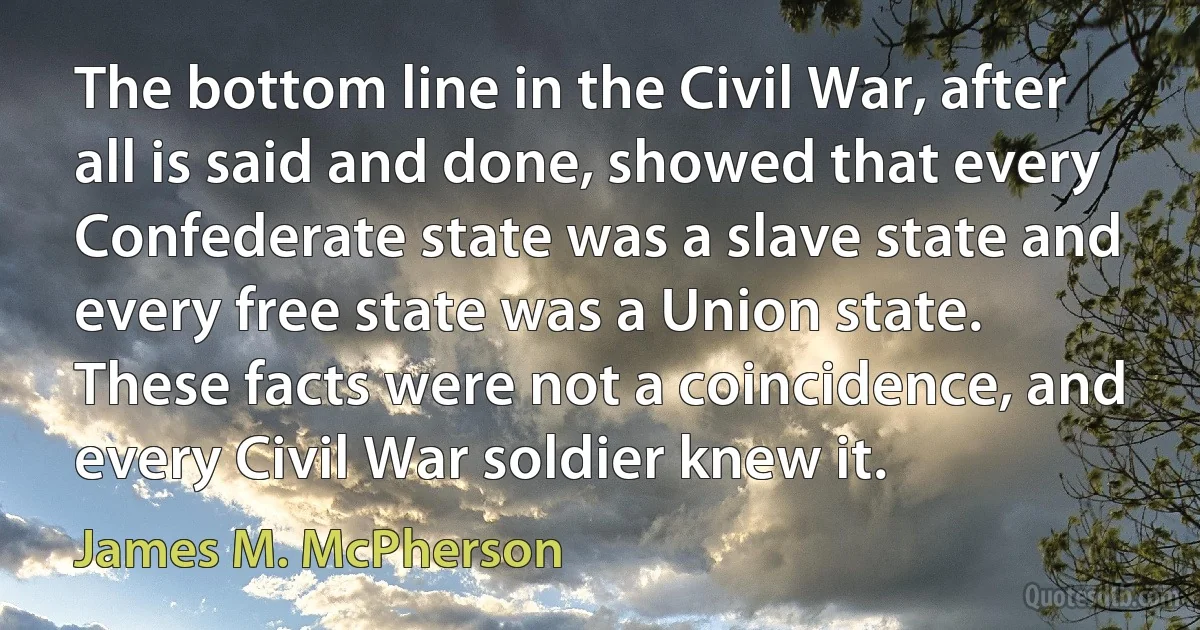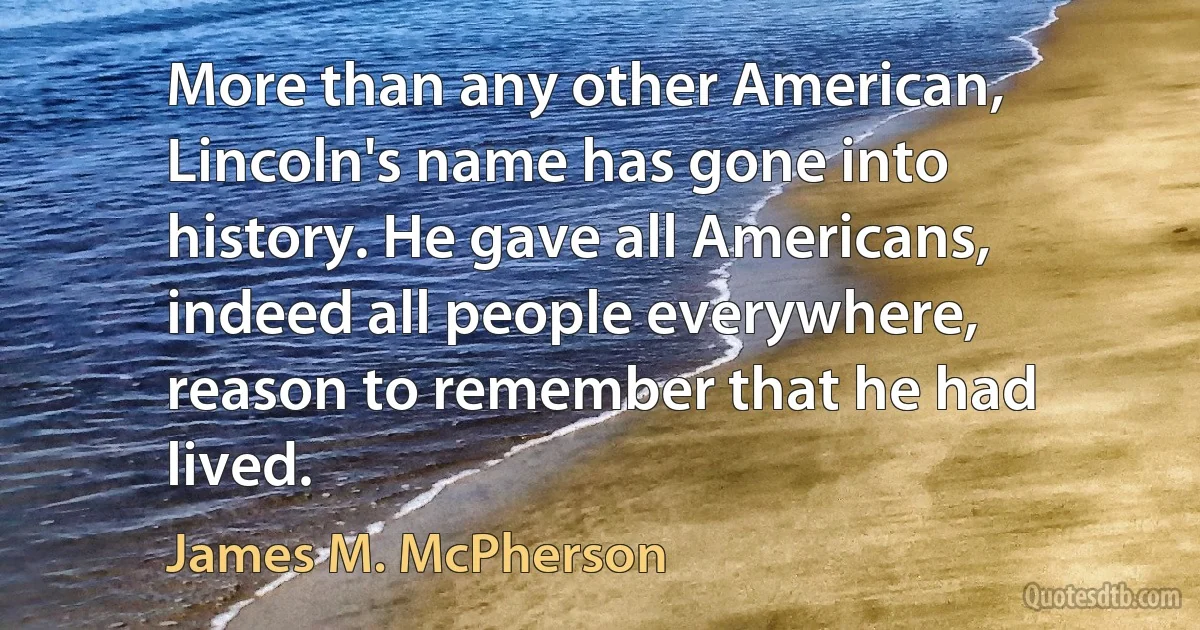James M. McPherson quotes
Powerful racial prejudices? That was not true of Thomas Wentworth Higginson, or Norwood P. Hallowell, or George T. Garrison, or many other abolitionists and sons of abolitionists who became officers in black regiments. Indeed, the contrary was true. They had spent much of their lives fighting the race prejudice endemic in American society, sometimes at the risk of their careers and even their lives. That is why they jumped at the chance of help launch an experiment with black soldiers which they hoped would help African Americans.

James M. McPherson
The great crisis facing the country was the rebellion and anybody in the North who wanted to preserve the Union now found the principal enemy to be those Southern slave owners who had broken up the country. The institution which sustained them and the institution they went to war to defend was slavery. And more and more northerners became convinced of that. As a consequence, a lot of them went the whole way over, from being conservative, pro-Southern, pro-slavery Democrats to becoming radical Republicans. Benjamin Butler is a good example, and Edwin M. Stanton is another one.

James M. McPherson
The Alabama Democratic convention [instructed] its delegates to walk out of the national convention if the party refused to adopt a platform pledging a federal slave code for the territories. Other lower-South Democratic organizations followed suit. In February, Jefferson Davis presented the substance of southern demands to the Senate in resolutions affirming that neither Congress nor a territorial legislature could impair the constitutional right of any citizen of the United States to take his slave property into the common territories.

James M. McPherson
There are all kinds of myths that a people has about itself, some positive, some negative, some healthy and some not healthy. I think that one job of the historian is to try to cut through some of those myths and get closer to some kind of reality. So that people can face their current situation realistically, rather than mythically. I guess that's my sense of what a historian ought to do.

James M. McPherson
Scorned and ridiculed by many critics during his presidency, Lincoln became a martyr and almost a saint after his death. His words and deeds lived after him, and will be revered as long as there is a United States. Indeed, it seems quite likely that without his determined leadership the United States would have ceased to be.

James M. McPherson
General Sherman, who had lived in the South, liked Southerners and did not at all sympathize with Northern racial views, yet became the most hated and feared destroyer of the South and its whole civilization. And I think he did so because he saw that as necessary to win the war. And I think Lincoln made some of his decisions-issuing the Emancipation Proclamation, for example, or turning Sherman loose - because he saw that as necessary to win the war.

James M. McPherson
Slavery was at the root of what the Civil War was all about. If there had been no slavery, there would have been no war, and that ultimately what the Confederacy was fighting for was to preserve a nation based on a social system that incorporated slavery. Had that not been the case, there would have been no war. That's an issue that a lot of Southern whites today find hard to accept.

James M. McPherson
What has changed is that I've gained a lot more sympathy for Lincoln. At the time I was doing my dissertation I tended to take the Wendell Phillips view of Lincoln. Why didn't he move more quickly? Why was he so conservative on some of these issues? Why didn't he seize this revolutionary moment? The more I've learned about it, the more I realize that Lincoln was under extraordinary pressure from all sides. In his position he could not have acted like Wendell Phillips. He would have lost the whole war.

James M. McPherson
By the time of the Gettysburg Address, in November 1863, the North was fighting for a 'new birth of freedom' to transform the Constitution written by the founding fathers, under which the United States had become the world's largest slaveholding country, into a charter of emancipation for a republic where, as the northern version of 'The Battle Cry of Freedom' put it, 'Not a man shall be a slave'.

James M. McPherson
While one or more of these interpretations remain popular among the Sons of Confederate Veterans and other Southern heritage groups, few professional historians now subscribe to them. Of all these interpretations, the states' rights argument is perhaps the weakest. It fails to ask the question, states' rights for what purpose? States' rights, or sovereignty, was always more a means than an end, an instrument to achieve a certain goal more than a principle.

James M. McPherson



